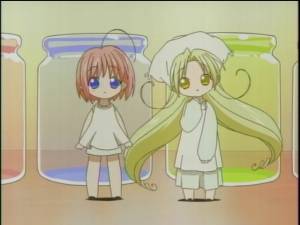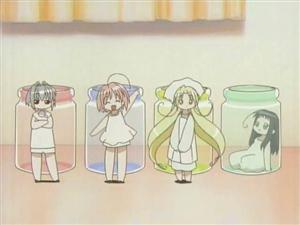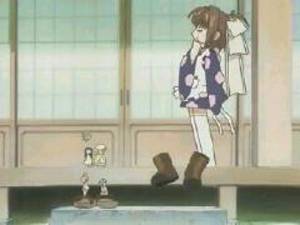

 Review by: Craig "Back Off! I've Got a Shrink Gun!" Norris
Review by: Craig "Back Off! I've Got a Shrink Gun!" Norris
Length: 13 episodes, 12 minutes each
Genre: Comedy
Watched: 1-13, subbed
I've heard of genies living in lamps, goddesses popping from mirrors, and leprechauns leaping off boxes of cereal. I thought I was fairly well versed in mythical creatures and their connections to inanimate objects. But fairies in bottles is a totally new concept to me. It sounded interesting, though, which is why I decided to check out Bottle Fairy. But it turns out that the series is not about fairies so much as it is about humans.
Plot synopsis: In their quest to become human, four diminutive fairies, Kururu, Chiriri, Sarara, and Hororo, have come to live with a young university student whom they call Sensei-san. While he's away at school, the four fairies use books, the advice of their neighbor, and mostly their imaginations to study the human world and prepare them for the day when their wish to become human comes true.
 Artwork: Simple and colorful visuals present the perfect platform for this series based on clever cuteness. The animation is just sharp enough so that it does not look hokey, while still retaining its minimalist charm. Particularly surprising were the character designs of the fairies, that one would expect to be ornate and more, well, fairy-like. Instead the only physical distinguishers of the four are their eye color and hair styles, as their universal mode of dress is simple off-white dresses and blouses. Technically the animation is substandard, but considering the subject matter, it fits perfectly.
Artwork: Simple and colorful visuals present the perfect platform for this series based on clever cuteness. The animation is just sharp enough so that it does not look hokey, while still retaining its minimalist charm. Particularly surprising were the character designs of the fairies, that one would expect to be ornate and more, well, fairy-like. Instead the only physical distinguishers of the four are their eye color and hair styles, as their universal mode of dress is simple off-white dresses and blouses. Technically the animation is substandard, but considering the subject matter, it fits perfectly.
Music: Again, nothing spectacular on its own, but it complements the mood of the series extremely well. The opening theme is so happy and addictive that it even now runs rampant through my mind, pushing out other, much more important memories, like my mother's birthday and my social security number. Plus, the lyrics pretty much explain the entire premise of the show, making remembering the back-story easy (if not mandatory). The rest of the soundtrack is full of simply rendered melodies that neither tickle the ear, nor clash with the content.
 Characters: Each fairy has an overarching personality of being inquisitive and na´ve, so individuality was built around those traits. Kururu is the most hyperactive and emotional, Sarara is tomboyish and staid, Chiriri is girlish and literal, and Hororo is absentminded with a big appetite. Since the focus of the show was not on developing characters, the personalities of the main protagonists were kept as simple as possible. Tama is their first grader next-door neighbor who offers overly dramatic, and sometimes erroneous, advice to the fairies. She likes to sound like she knows more than she actually does. Sensei-san's personality is not explored very deeply, as he is not around most of the time. He acts as the caretaker for the fairies, and he obviously cares significantly about them. Oboro is a small plush ornament that the fairies brought to life, and spends his time flying around aimlessly at low speeds. Hororo seems particularly attached to him, even though he really doesn't do much. The characters aren't the most engrossing, but what little is known of them is played upon expertly and makes them appear more dynamic than they actually are.
Characters: Each fairy has an overarching personality of being inquisitive and na´ve, so individuality was built around those traits. Kururu is the most hyperactive and emotional, Sarara is tomboyish and staid, Chiriri is girlish and literal, and Hororo is absentminded with a big appetite. Since the focus of the show was not on developing characters, the personalities of the main protagonists were kept as simple as possible. Tama is their first grader next-door neighbor who offers overly dramatic, and sometimes erroneous, advice to the fairies. She likes to sound like she knows more than she actually does. Sensei-san's personality is not explored very deeply, as he is not around most of the time. He acts as the caretaker for the fairies, and he obviously cares significantly about them. Oboro is a small plush ornament that the fairies brought to life, and spends his time flying around aimlessly at low speeds. Hororo seems particularly attached to him, even though he really doesn't do much. The characters aren't the most engrossing, but what little is known of them is played upon expertly and makes them appear more dynamic than they actually are.
Plot: Each episode is self-contained and deals with a separate aspect of Japanese culture. The episodes advance by month, starting in April and ending in March. Most of the episodes consist of the fairies learning about a tradition, event, or social issue, then letting their imaginations run wild as they attempt to discover its true significance. Sort of like a Japanese version of Muppet Babies. Most of these discovery sessions are comedic (and extremely witty), but a few contain immense anxiety, which is expressed with a moderate degree of success.
 CHICKS!: Not only are most of the chick in this series about six inches tall, none of them appear even close to legal age. So, in case of the unlikely (but plausible) event that the FBI is monitoring this computer for child pornography, I think I'll leave this section alone.
CHICKS!: Not only are most of the chick in this series about six inches tall, none of them appear even close to legal age. So, in case of the unlikely (but plausible) event that the FBI is monitoring this computer for child pornography, I think I'll leave this section alone.
Overall: This series can be summed up in one word: simple. It avoids complexities to appeal to the widest audience range. It is also quite educational, as I learned a few things about Japanese culture that I had no idea about previously. Plus, the series proves that plot and substance are not necessarily the same, as it is light on the former yet heavy on the latter. With a mixture of zany humor and poignant maturity, this anime does not run a wide emotional gamut, but explores a handful very well.
 IN A NUTSHELL:
IN A NUTSHELL:
+ Cute beyond comprehension
+ Successful in simplicity
+ Consistently clever
- May be too saccharine for some
Rating: 8/10
Return to Index

